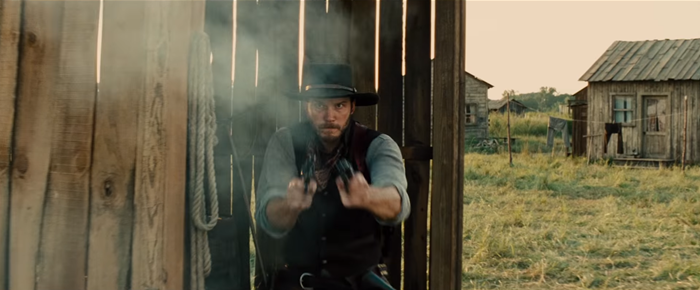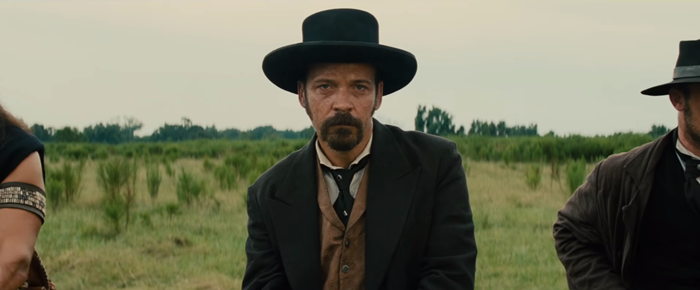I’m not sure what meaning there is in “remaking” The Magnificent Seven, given that the Seven Samurai template has been such a well-worn plot device in the past 60 years. In a time when The Force Awakens is essentially an uncommented-upon remake of a movie in the same film series, Antoine Fuqua could have delivered nearly the same final cut under a different name and he wouldn’t even need to acknowledge the comparison. It would have made it a little easier to view each component of his film on its own and not in comparison to its 1960 predecessor, but this year’s The Magnificent Seven doesn’t completely suffer for the comparison. Only mostly.
My biggest problem with Mag7 2016 is that it doesn’t make much sense—which by the standard of modern blockbusters isn’t too bad, really. It’s a big spectacle with a fun cast and gobs of gunslinging action. You leave the theater listening to the absolutely fantastic theme of the original The Magnificent Seven and feel pretty good about the past two hours of your day. But that enriching feeling you get from reflecting on a great film and how it affected you isn’t there. In its place is a question: what did I like about that movie?
The Good

In this case, it’s mostly Ethan Hawke. Hawke is fantastic as Goodnight Robicheaux, a former ace Confederate sharpshooter hiding his crippling PTSD from a world that still respects and fears him. He earns his bread as a fight promoter for Billy Rocks, played by Byung-hun Lee in the mostly-physical role of a knife master. In a movie that I mostly enjoyed for the chumminess between the gunslingers, Goodnight’s explicitly codependent friendship with Billy stands out.
It helps that Goodnight also gets the fullest characterization and the only real character arc of the Seven, but Hawke doesn’t waste anything the script gives him. Take a scene where the dipshit farmers are failing their marksmanship training: Robicheaux screams that you have to HATE who you’re shooting at, and the man genuinely looks like he could just as easily open fire on his pupils or break down crying within moments. Hawke is bar-none the best part of this film.
The Bad
At the other end of the spectrum is Chris Pratt, whose inclusion makes me wonder if the filmmakers even had a solid idea of what kind of movie they were making. He plays “drunk Irishman” Josh Faraday, who has a stupid Gambit-like gimmick about card tricks, and also apparently a psychotic tic that makes him murder anyone who touches his guns. Usually he’s played for comedy, but the kind of shitty comedy that typically accompanies the music cutting out when someone makes an awkward joke in a movie trailer. I get that Chris Pratt’s whole thing is basically “flopping around like a tonal fish out of water and ruining the scene” and people find that hilarious, but I guess I hate Chris Pratt.
There are times when Pratt goes serious, but honestly that’s even worse. Like when he tries to use slight-of-hand card tricks to teach a villager about quick-drawing, and he suddenly pulls a gun on the guy and says “It was never about the cards.” His nasal voice still sounds like he’s joking and, well, it’s an idiotic scene and I have no idea where they were going with it anyway, so maybe that’s on the script. Or maybe that was supposed to be funny? I honestly don’t know. Faraday is ostensibly the hero of this story, which is just fucking bizarre to me.
The Ugly

Below Pratt’s character—who save one egregiously dumb scene is mostly a benign, occasionally pleasant force in the movie—is the villain. Replacing the bandits of Seven Samurai and The Magnificent Seven is corrupt industrialist Bartholomew Bogue, played to maximum sliminess by a wraith-like Peter Sarsgaard.
The thing about Bogue is he might as well be a giant anthropomorphic pig in a top hat with CAPITALISM scrawled over his suit. In a movie where one character (Denzel Washington’s adequately manly Sam Chisolm) is a bounty hunter seeking out thieves and killers far and wide across the Continental United States, Bogue goes in-person to murder an entire town of people and expects, I suppose, to retire to his Sacramento estate afterwards with no ill repercussions.
Even fucking Hedy Hedley Lamarr had a more realistic take on the underhanded land theft scheme, and this from a movie that famously brought farting to the silver screen. As soon as Bogue enters the story, it becomes a cartoon with no sense of connection to the villagers’ plight, or the Seven’s noble struggle, or any of the depth and heroism that’s practically built into the plot engine. And he enters the story about two minutes into the film.
Thing is, The Magnificent Seven is a character-driven movie with no characters I loved, about two liked, and a messload of others who ranged from amiable to annoying. The plot is as predictable as you could possibly make out of this template (I mean this literally) and the action and cinematography aren’t strong enough to carry all the weight left on them. It’s just not pretty enough to be this vapid.
The tempting claim is that the people who made this film never watched Seven Samurai or The Magnificent Seven, but I’m fairly certain they did, and that’s the reason they wanted to remake it. More likely, they never stopped to ask the question: what did I like about those movies?

Leave a Reply